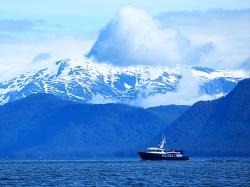Efforts Underway To Ensure 'Alaskan' Seafood Is Authentic
November 13, 2015 | 1 min to read

As a result of international tracking difficulties, seafood marketed as “Alaskan” is often anything but, sparking legislative calls to make the Alaska label a privilege, not a right.
Wild-caught Alaska seafood is marketed as sustainable and healthy for local economies, strong selling points for the modern U.S. consumer. The labels aren’t always accurate, however, as pirate fishing and outright fraud often put foreign or untracked seafood under the Alaska banner.
International agreements and national legislation aim to impose more stringent tracking requirements for seafood landings, which are often the root of mislabeled fish. Other legislation simply pushes for marketing changes to make sure the label “Alaska” means what it says.
To read the rest of the story, please go to: Alaska Journal of Commerce
